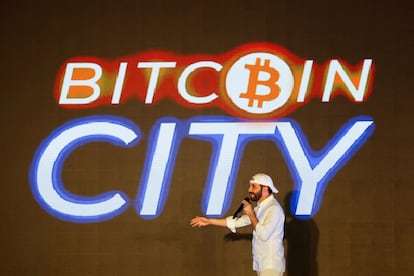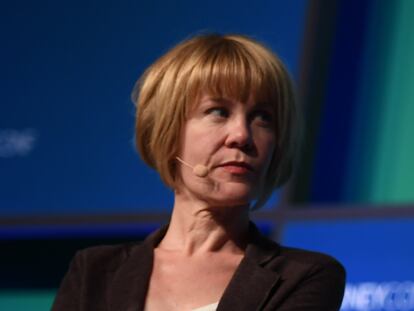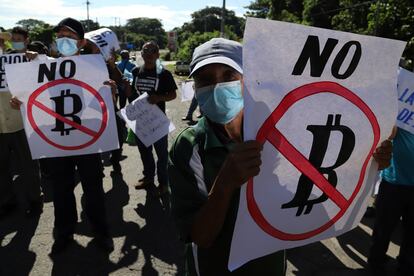Crypto evangelists enter the Bukele government: The dark business of bitcoin in El Salvador
The Salvadoran president has appointed two U.S. crypto investors to lead the country’s National Bitcoin Office, as the IMF issues more warnings about the country’s so-called volcano bonds


American crypto evangelist Max Keizer has compared Salvadoran President Nayib Bukele to John F. Kennedy and El Salvador to the kingdom of Camelot, describing it as a kind of promised land for bitcoin where taxes and central banks are sleighed like dragons. Until a few months ago, Keizer — an American former stockbroker and reporter close to Russian propaganda sites — was just another one of the many outlandish characters who began to arrive in the country in 2021, after Bukele announced that El Salvador would be the first in the world to accept bitcoin as legal currency.
Many of those characters — a mix of anarcho-capitalists, cyber-utopians and plain old opportunists — left El Salvador as enthusiasm for the bitcoin project began to wane. Only 14% of the country’s businesses have ever used bitcoin, according to official figures. But those characters who are still in the country have gone in all the way — people like Keizer and his wife, Stacy Herbert. Since the end of last year, Keizer and Hebert have been in charge of the country’s National Bitcoin Office. El Salvador, one of the smallest and poorest countries in the region, has crypto evangelists within the government.

The creation of the National Bitcoin Office, like the rest of Bukele’s crypto project and much of his government’s management, is shrouded in secrecy. The only figures that have been made public are the $200 million that was spent on the infrastructure to launch the digital currency, such as bitcoin ATMs and a cellphone app. Beyond what Bukele has announced on Twitter, it also not known much the country has invested in bitcoin. Like Bukele, Keiser and Herbet are also active on social media, with more than 700,000 followers. Their YouTube shows and podcasts are the main source of information on El Salvador’s bitcoin policies.

Keiser and Herbert both present themselves as some kind of crypto police or crypto judges. They are authorized to investigate possible fraud, and they are the ones who decide which investor is allowed in and which is not. “We do not receive any salary for this. We do it for President Bukele,” Herbert often says, while her husband calls their work “an act of love.” Leaving aside their alleged altruism, the couple owns Heisenberg Capital, a fund belonging to Bitfinex, one of the world’s largest platforms for buying and selling bitcoin. And they also own El Zonte Capital, another fund dedicated exclusively to digital investments in El Salvador.
Propaganda and corporate diplomacy
Ricardo Valencia, professor of Political Economy at California State University, argues that for Keiser and Herbert, “the true value of the office is not monetary, but for propaganda and corporate diplomacy.” The National Bitcoin Office is attached to the Presidency of the Republic and has the power to establish international relations. Valencia, who is also a specialist in communication, points out that “it has the ability to design public policies that are mandatory for other ministries in the country and grants Keizer and Herbert official titles to inaugurate bitcoin embassies in Europe and the United States.”
Texas and Switzerland have already welcomed Salvadoran bitcoin embassies, which work in parallel to official diplomacy channels. “A network of apocryphal diplomats is being built that will serve to spread official and corporate propaganda. It is an exchange of favors within the patrimonial use of the state. In El Salvador, there is no difference between Bukele’s personal deposits and public finances,” adds Valencia. Given the risks involved with bitcoin, such as its great volatility and lack of transparency, Bukele’s decision to make the cryptocurrency legal tender has sparked sharp rebuke from the International Monetary Fund (IMF), ratings agencies and even the U.S. government.

Bitcoin City
In June 2021, Bukele announced that bitcoin would be the official currency in his country, along with the dollar. He made the announcement during the Bitcoin Conference in Miami, a large-scale event with concerts, sumo wrestlers, televangelist-style presentations and slogans such as “death to the dollar” and “everyone against the Federal Reserve.” Crypto evangelists criticize the state because they consider it the enemy of what they call “individual sovereignty.” For them, neither Elon Musk nor Mark Zuckerberg are disruptive enough. They understand life in society as a jungle or a casino, where practically the only law is the direct exchange of digital money.
Bukele also shares this messianic tone and flashy exhibitionism. At the end of 2021, Bukele hosted Bitcoin Week in El Salvador — an event that tried to emulate the vibe of the Miami conference. At the party to celebrate the end of the event, Bukele took to the main stage, at the foot of the beach, while a giant screen projected in neon blue letters: “The President.” Laser lights, smoke cannons and fireworks went off as the president took the microphone: “When Alexander the Great was conquering the world, he decided to establish 20 Alexandrias throughout his empire. These cities were beacons of hope for the rest of the planet. We must establish our first Alexandria here, in El Salvador. Let’s build Bitcoin City.”

Bukele said his Bitcoin City would be powered by geothermal energy from a nearby volcano, and that the money to set up schools, hospitals and the rest of the services needed would come from so-called volcano bonds or bitcoin bonds: new Salvadoran public debt securities backed by bitcoin. A year and a half after the announcement, El Salvador — turning a deaf ear to the IMF’s warnings — has prepared a law that will allow it to raise $1 billion via bitcoin-backed bonds. Keizer and Herbert have played a key role in this process. According to an investigation by The Wall Street Journal, Bitfinex — the parent company of their two funds — will provide not only the technological platform for the bonds, but will also request a license to operate as a trader.
But Keizer and Herbert are not the only influential figures from the crypto world who have collaborated in implementing El Salvador’s bitcoin transition. Jack Mallers, a 27-year-old who created an application for instant money transfers via bitcoin, was one of the president’s closest advisers in drafting the law that formally introduced the currency to the country. Like Keizer and Herbert, he also had a vested interest in El Salvador’s bitcoin project: he was hoping his application would be able to gain ground in the country’s remittance market. Some 20% of El Salvador’s gross domestic product (GDP) comes from money that is sent by Salvadorians living abroad, especially in the U.S. But the project did not work out, and according to sources close to Mallers, he has not set foot in the country again.

Only 2% of remittances are transferred via bitcoin, according to data from the Central Bank. And around 70% of Salvadorans do not even have a bank account. “Financial inclusion was one of the objectives of the bitcoin project. But there is no public policy that develops these objectives,” says economist Tatiana Marroquín. “The other goals were to promote the country’s brand image and the reception of tourists. But with everything that has happened with bitcoin in recent months —falling prices, financial fraud — El Salvador’s financial profile has fallen instead of rising.”
Bitcoin has lost 40% of its value in the past year. And since Bukele announced that it would be legal tender, the IMF has been issuing more and more warnings. The last warning was in response to the imminent issuance of the so-called volcano bonds. In a statement last month, the international institution stressed: “Given the legal risks, fiscal fragility and largely speculative nature of crypto markets, the authorities should reconsider their plans to expand government exposures to Bitcoin, including by issuing tokenized bonds.”
Sign up for our weekly newsletter to get more English-language news coverage from EL PAÍS USA Edition
Tu suscripción se está usando en otro dispositivo
¿Quieres añadir otro usuario a tu suscripción?
Si continúas leyendo en este dispositivo, no se podrá leer en el otro.
FlechaTu suscripción se está usando en otro dispositivo y solo puedes acceder a EL PAÍS desde un dispositivo a la vez.
Si quieres compartir tu cuenta, cambia tu suscripción a la modalidad Premium, así podrás añadir otro usuario. Cada uno accederá con su propia cuenta de email, lo que os permitirá personalizar vuestra experiencia en EL PAÍS.
¿Tienes una suscripción de empresa? Accede aquí para contratar más cuentas.
En el caso de no saber quién está usando tu cuenta, te recomendamos cambiar tu contraseña aquí.
Si decides continuar compartiendo tu cuenta, este mensaje se mostrará en tu dispositivo y en el de la otra persona que está usando tu cuenta de forma indefinida, afectando a tu experiencia de lectura. Puedes consultar aquí los términos y condiciones de la suscripción digital.








































